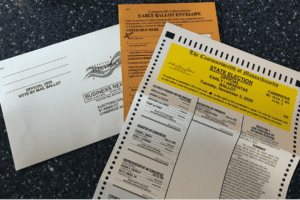What’s at stake in the election when it comes to children with disabilities?
The ADA (Americans with Disabilities Act) and IDEA (Individuals with Disabilities Education Act) are federal laws and are not decided by each state. But federal laws are impacted by the president, our members of Congress, and, in some cases, the Supreme Court.
At both the state and the federal level, decisions about funding, insurance, and education can impact the availability of services people with disabilities may need. Here are some examples:
- Education funding impacts how many support team members are available to support students with disabilities
- Education policy can mean more inclusive schools – or the opposite
- State Medicaid funding can impact what Medicaid pays for and who can get Medicaid
- Elected officials can decide to enforce accessibility codes for building construction – or they can decide this is not a priority
Here are two ways to learn:
1. Talk to people you know who have the same concerns as you.
Ask what they know about the choices of candidates. Important: ask how they know this. A lot of false information is spread through social media like Facebook. If this is how you got information, try to find another source or website to confirm it! Make sure it is a website that ends in .gov or .org.
2. Look up the candidates online to see what their beliefs are.
See if your state’s election site has information about the candidates and questions. Search for the candidates’ names and go to their official websites. Learn how they voted in the past to see how they really think. Here are some sites to help: Know Your Vote, Vote 411, Ballot Ready. These are not supporting a certain party or candidate. They are just giving information.
Finally: make sure you know about voter protection and accommodations in your state for people with disabilities.
Check out this guide to Voting with a Disability . This will walk you through everything from how to register (check the deadlines for your state!) to what you can do if the right accommodations are not available to you.




